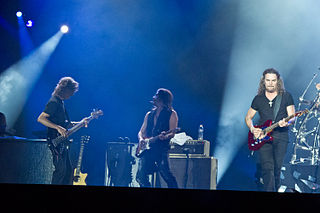
Los Lobos is an American rock band from East Los Angeles, California. Their music is influenced by rock and roll, Tex-Mex, country, zydeco, folk, R&B, blues, brown-eyed soul, and traditional music such as cumbia, boleros and norteños. The band rose to international stardom in 1987, when their version of Ritchie Valens' "La Bamba" peaked at the top of the Billboard Hot 100, and also topped the charts in the United Kingdom, and several other countries. Songs by Los Lobos have been recorded by Elvis Costello, Waylon Jennings, Frankie Yankovic, and Robert Plant. In 2015, they were nominated for induction into the Rock and Roll Hall of Fame. In 2018, they were inducted into the Austin City Limits Hall of Fame. They are also known for performing the theme song for Handy Manny.

Chicano rock, also called chicano fusion, is rock music performed by Mexican American (Chicano) groups or music with themes derived from Chicano culture. Chicano Rock, to a great extent, does not refer to any single style or approach. Some of these groups do not sing in Spanish at all, or use many specific Latin instruments or sounds. The subgenre is defined by the ethnicity of its performers, and as a result covers a wide range of approaches.

Bronco is a Mexican grupero band originating from Apodaca, Nuevo León. Their modern take on regional Mexican music in the 1980s and 1990s helped earn them international recognition with original band members José Guadalupe "Lupe" Esparza, Ramiro Delgado, Javier Villareal, and José Luis "Choche" Villareal creating music that would go on to top record charts. The band is well known for their use of modern instruments, particularly the synthesizer and musical keyboards, as part of the incorporation of pop-style music. As with many grupera bands, members wore matching jumpsuits.

The music of Mexico is very diverse and features a wide range of musical genres and performance styles. It has been influenced by a variety of cultures, most notably deriving from the culture of the Europeans, Indigenous, and Africans. It also sometimes rarely contains influences from Asians and Arabs, as well as from other Hispanic and Latino cultures. Music was an expression of Mexican nationalism, beginning in the nineteenth century.

Alberto Aguilera Valadez, known professionally as Juan Gabriel, was a Mexican singer, songwriter and actor. Colloquially nicknamed Juanga and El Divo de Juárez, Juan Gabriel was known for his flamboyant style, which broke barriers within the Latin music industry. Widely regarded as one of the best and most prolific Mexican composers and singers of all time, he is often been referred to as a pop icon.

Ariadna Thalía Sodi Miranda, known mononymously as Thalía, is a Mexican singer and actress. Referred to as the "Queen of Latin Pop", she is considered one of the most successful and influential Mexican artists. Having sold around 20 million records worldwide, she is one of the best-selling Latin music artists of all time. Aside from her native Spanish, Thalía has also sung in English, French, Portuguese and Tagalog.

Luis Miguel Gallego Basteri is a Puerto Rican–born Mexican singer and record producer. Born to parents of Spanish and Italian descent, he is often referred to as El Sol de Mexico, derived from the nickname his mother gave him as a child: "Mi sol". Luis Miguel has sung in multiple genres and styles, including pop songs, ballads, boleros, tangos, jazz, big band, and mariachi. Luis Miguel is also recognized as the only Latin singer of his generation to not cross over to the Anglo market during the "Latin Explosion" in the 1990s.
The Grammy Award for Best Mexican/Mexican-American Album was an award presented to recording artists for quality albums in the Mexican music genre at the Grammy Awards, a ceremony that was established in 1958 and originally called the Gramophone Awards. Honors in several categories are presented at the ceremony annually by the National Academy of Recording Arts and Sciences of the United States to "honor artistic achievement, technical proficiency and overall excellence in the recording industry, without regard to album sales or chart position".

María Guadalupe Araujo Yong, better known as Ana Gabriel, is a Mexican singer and songwriter. During her long career, she has performed different genres of music and has received several accolades. As a result, she has been called La Diva de América and La Luna de América.
"La Bamba" is a Mexican folk song, originally from the state of Veracruz, also known as "La Bomba". The song is best known from a 1958 adaptation by Ritchie Valens, a Top 40 hit in the U.S. charts. Valens's version is ranked number 345 on Rolling Stone magazine′s list of the 500 Greatest Songs of All Time.

Maná is a Mexican pop-rock band. Formed in 1981 as Sombrero Verde, the current lineup consists of vocalist/guitarist Fher Olvera, drummer Alex González, guitarist Sergio Vallín and bassist Juan Calleros. The band is considered one of the best-selling Latin music artists and the most successful Latin American band of all time with over 25 million records sold worldwide. Maná has moreover earned four Grammy Awards, eight Latin Grammy Awards, five MTV Video Music Awards Latin America, six Premios Juventud awards, 19 Billboard Latin Music Awards, and 15 Premios Lo Nuestro awards.

Los Tigres del Norte are a norteño band from San Jose, California. Originally founded in the small town Rosa Morada in the municipality of Mocorito, Sinaloa, Mexico, with sales of 32 million albums, the band is one of the most recognized groups in the genre, due to its long history and its successes within the Mexican community in the diaspora. The band is famous for its political corridos, some of which have been censored, even in its own country. The band is the only Mexican group to win 7 Grammy awards and 12 Latin Grammys. In addition, the band has made 40 films alongside the Almada brothers among other well-known Mexican actors.
José Guadalupe Esparza is a Mexican singer-songwriter and the frontman of the grupero band Bronco. He was born in Durango, but grew up in the city of Apodaca, Nuevo León, where he attended elementary and high school.
Mexican pop is a music genre produced in Mexico, particularly intended for teenagers and young adults.

Christopher Alexander Luis Casillas von Uckermann is a Mexican singer, songwriter and actor.

Grupera is a genre of regional Mexican music. It reached the height of its popularity in the 1990s, especially in rural areas. The music has roots in the rock groups of the 1960s, but today generally consists of four or more musicians using electric guitars, keyboards and drums. The music increased in popularity in the 1980s and became commercially viable, and is now recognized in some Latin music awards ceremonies such as Lo Nuestro and The Latin Grammy Awards. Grupero artists typically perform rancheras, corridos, cumbias, charangas, ballads, boleros and chilenas/huapangos.
This article includes an overview of the major events and trends in Latin music in the 1980s, namely in Ibero-America. This includes recordings, festivals, award ceremonies, births and deaths of Latin music artists, and the advancement and adjournment of the genre from 1980 to 1989.

Natanael Ruben Cano Monge is a Mexican rapper, musician and singer. He is best known for the unique blend of traditional Mexican corridos and American hip hop music. Cano was the first musician to publicly fuse this variant of the two genres together which has made him stand out. This genre was dubbed corridos tumbados. The idea to fuse the two genres was proposed by Dan Sanchez whom wrote Natanael's first corrido tumbado, "Soy El Diablo".
Ovidio Crespo, better known by his stage name as Ovi, is a Cuban singer of Corrido, Reggaetón and Latin trap.












